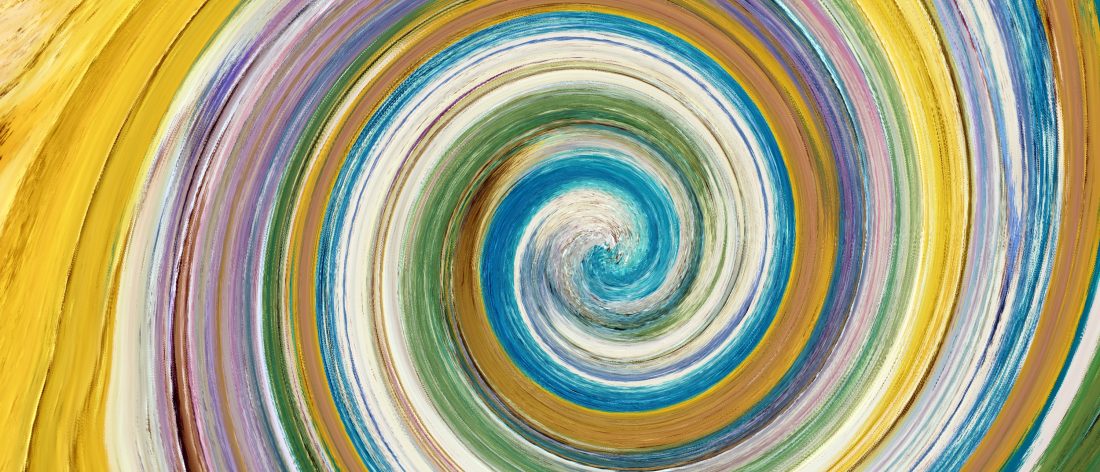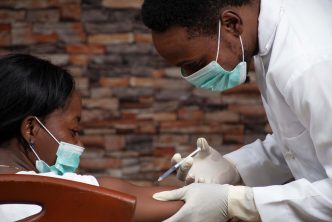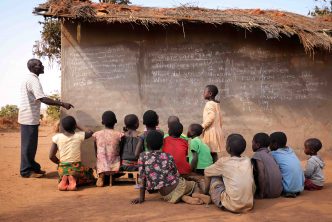Nextier Advisory
Patrick Okigbo III in conversation with Bishop Matthew Kukah
Bishop Matthew Hassan Kukah is the Bishop of the Catholic Archdiocese of Sokoto, Nigeria, and is one of Nigeria’s most prominent public intellectuals. He studied Philosophy and Theology at the St. Augustine Major Seminary in Jos and was ordained a Catholic priest in 1976.
He has a Diploma in Religious Studies from the University of Ibadan and a Bachelor of Divinity degree from the Pontifical Urban University, Rome. He attended the University of Bradford, where he obtained a Master’s degree in Peace Studies, and he earned a Ph.D. from the School of Oriental and African Studies at the University of London. He is a Senior Rhodes Fellow at St. Anthony’s College at the University of Oxford and an Edward Mason Fellow at the Kennedy School of Government at Harvard University.
Bishop Kukah was a member of the Human Rights Violation Investigation Commission, Secretary at the National Political Conference, and current Chairman of the Ogoni Shell Reconciliation. He was also a Member of the Electoral Reform Committee. He is Chairman of the Committee on Interreligious Dialogue at the Catholic Bishops Conference, Member of the Pontifical Council for Interreligious Dialogue, and Chairman, Committee on Interreligious Dialogue at the Regional Episcopal Conference of West Africa.
Preamble
A state is not a static construct. It evolves out of continuous engagement with society. This balancing act – which Acemoglu and Robinson (2019)[1] refer to as “the Red Queen effect” – guarantees liberty, which, in turn, leads to development. The Chinese classic, The Romance of the Three Kingdoms, states that “The empire, long divided, must unite; long united, must divide. Thus, it has ever been.” This quote explains the scenario in many Africa countries that, through turmoil, have found unity, no matter how tenuous (Ethiopia, Sudan, Congo). So, it may be for countries that today maintain a façade of unity; they, too, may decline to turmoil. For this reason, Chido Onumah, a journalist and author, cautions that Nigeria is negotiable.[2] Nothing should be taken for granted.
Nigeria is becoming a dream differed. The hopes, aspirations, and prospects that imbued the hearts of Nigerians at their political independence in 1960 are unrealised. According to data presented by the Pew Research Centre, only 39 percent of Nigerians are satisfied with the state of democracy in the country. Fifty-seven percent of Nigerian adults polled between June 25 and July 30, 2018, believes that “no matter who wins an election, things do not change very much for people in Nigeria.” Seventy-two percent of respondents believe the statement that “most politicians are corrupt.” Over half of Nigerians still describe the economy as bad. These sentiments are a significant departure from the high hopes in 1960 when Nigeria became the world’s most-populous free black nation.
The development indicators are dire. Although endowed with abundant human and natural resources, Nigeria is unable to translate these assets into sustained economic growth and human development. Although the country averaged a gross domestic (GDP) growth rate of 7 percent per year from 2000 to 2014, the rate dropped to 2.7 percent in 2015 and contracted by 1.6 percent in the following year. In the last two years, growth has hovered around 2 percent. According to the International Monetary Fund, Nigeria’s real GDP growth for 2020 would contract by 5.4{1c02100822988c48c7b0a484ab61ac3d7f398d67c2f66594d88b2db33072d9d9}. In other words, Nigeria’s near-term economic outlook is bleak.
Indeed, Nigeria has traded-in its spurious title of “Giant of Africa” for the “poverty capital of the world.” With a population of over 200 million, Nigeria has the largest population in Africa, projected to double by 2050. Amidst this challenge, a little over 100 million people are living in extreme poverty, with an unemployment rate of 23.1 percent. The country falls in the low human development category with a score of 0.534 (2018) against the world average of 0.731, ranking 158th out of 189 countries.
Nigeria is in the vortex of centrifugal forces, pulling her away from her orbit. Several of these forces are rooted in her history and various choices from decades ago: identity in its various manifestations (religion, ethnicity, cultural diversity, elitism), pluralism, politics, corruption, lack of intellectual rigour, and many more. To ascend the development ladder, Nigeria needs a rigorous exploration of these forces and to find a way to channel them properly.
Nigerians are no longer shocked by the level of corruption in the country. The quantum and frequency of reportage of corruption in the news media have desensitised the people. Corruption is a pervasive issue that permeates all sectors of society. Of the 180 countries surveyed as part of the Transparency International Corruption Perceptions Index (CPI), Nigeria ranked 146th, scoring 26, below the sub-Saharan African regional average of 32. The CPI uses a scale of 0, highly corrupt, to 100, very clean.
Poor leadership exists in a vicious cycle with corruption. The two factors enable and reinforce each other. Even the opportunity to select elected officials is undermined by electoral corruption. This challenge results in ineffectual leadership, partisanship, nepotism, patronage politics that contribute to weak governance, lack of development, and poor service delivery in the country.
National unity in Nigeria is waning. Many conflicts in the country today are worsened by ethnic and religious tensions, although they might not be the originating causes. Political elites take advantage of these differences to further their interests by reinforcing the divisions.
Nigeria faces a wide range of security challenges. These challenges include the Boko Haram insurgency, farmer-herder clashes, kidnapping, robbery, and many others. Not only do these incidents heighten the sense of insecurity internally, but they also reduce the attractiveness of the country to investors.
The future is not assured as the country invests poorly in her children and youth. According to the National Bureau of Statistics (2018), 55.4 percent of the young people aged 15-34 were either unemployed or underemployed.[3] Formal education is also not secure, with over 13 million out-of-school children and the very controversial Almajiri system. The lack of development in the country translates into reduced availability of education and employment opportunities for the youth. This situation contributes to the instances of conflict observed, which in turn hamper development.
Bishop Matthew Hassan Kukah was the guest on “Development Discourse with Patrick Okigbo III” on July 26, 2020. The conversation explored the centrifugal forces that tend to divide and explored the centripetal forces required to pull the country together. A summarized version of the conversation follows.
The inability to define what is happening in the country in totality clearly suggests that Nigerians have been travelling on a road without maps. The issue of our collective, individual and communal identities are highly unresolved and undefined.
Bishop Kukah discussed that the persistence and escalation of these crises show the Nigerian state’s inability to come to terms with them. Since the civil war, the country has never really known peace and stability because communal crises have been with us for as long as anyone can remember.
As a result of the overarching nature and universal claims of religious identities, such as Islam and Christianity, these crises dwarf ethnic crises, but they are calamities nonetheless. They are evidence of the Nigerian State’s unresolved issues.
The first tragedy is the inability to define what we are dealing with as a country. Half-hearted definitions lead us to almost the same conclusion; with a wrong diagnosis and improper treatment. The issues of the crises we face in Southern Kaduna have been in gestation for a long time. The problems are a part of a long history of unresolved narratives from the Sokoto caliphate, British colonialism, the contradictions of military rule, and the Nigerian State’s distortions. These have all come together and what we are witnessing in Nigeria are occasional bursts here and there.
Bishop Kukah expressed that we still have many unresolved problems and have not started on the road to building a viable nation that can serve as a platform for building an egalitarian, non-discriminatory society.
BUHARI ADMINISTRATION
In one of your essays, you said that the failure that we are seeing is the failure of our leaders to have the ability to manage the plurality we see in our society today. In another essay, you were a bit severe in your characterisation of the Buhari administration as, in your words, “bigoted with lopsided political appointments.” It is refreshing to see that it appears the new Chief of Staff agrees with that characterisation, and that is why he has highlighted it is one of the issues he needs to deal with urgently. But what troubles me is, what is it about today’s Nigeria that has made it possible for such lopsided appointments to even happen in the first place? What should happen going forward to ensure that we get out of this situation and that we never come back to it?
A leader should have a text, philosophy, an ideology that people subscribe to and can run with independently. Bishop Kukah stated that he had his fears about the Buhari administration, which he expressed early on. He believes that Buhari is a good man, but there are many good people who are leading badly.
Talking about fighting corruption in a highly convoluted environment like Nigeria – where corruption is the top, bottom, and the only thing working – means not understanding how this country is framed. It also speaks to the nature of our capacity to interrogate individuals who want public office. Anybody that wants to govern Nigeria should be made to answer critical questions.
What this means for Nigerians going forward is that individuals must show a proper understanding of the problems that Nigerians face as opposed to electing people on the grounds of messianic claims. Nigerians must interrogate the nature of the choices they make.
I am going to come to the issues of corruption and electoral reforms in a minute, but I wanted to just get a few things out of the way. There is increasing suspicion of a plan towards ethnic hegemony of some sorts. You talk to people, and there’s a fear of some grand scheme of a Fulani domination of Nigeria. As someone who deals with these issues, probably daily, is it based on any empirical evidence, or is it just another urban myth that has just found a life of its own?
Bishop Kukah is working on a revised version of his Ph.D. thesis, which became “Religion, Politics, and Power in Northern Nigeria,” to expand the scope of the argument. The book addresses the nature, character, and the formation of what he calls the Hausa-Fulani hegemony.
There is a vast body of very educated northerners – Muslims, Fulanis, Hausas, Nupes, all kinds of people – desperate to move away from the shadow of a hegemonic and anxious to create an equal society with greater respectability for religion. The end of Buhari’s tenure is going to mark a defining moment for northern Nigeria. Therefore, the rest of Nigeria must be ready to open up conversations with individuals in northern Nigeria. These should be individuals who feel passionately about this country and who would like to see a much more open and transparent society.
It is quite ironic that Zamfara state, which adopted the Sharia law, today ended up being almost the epicentre of banditry. Nigeria must resolve the issues of democracy. Regardless of their identity, everybody must be negotiated within this matrix of what it means to live in a democracy. The system involves a quantum of rights that should be known to everybody. While people have religious aspirations, you cannot try to build a democracy while subverting it by wanting to create a theocracy,
Nigerians must be in a position to interrogate anybody who has claims to be their leader. They must interrogate their antecedents to ensure that they can be entrusted with Nigerians’ common welfare. Leaders cannot get into power and suddenly realise that our votes are essential but that our faces are unimportant. This interrogation is necessary because the challenge for us as a nation is our inability to manage diversity.
Democracy in Nigeria is a bit jaundiced because of the way it is set up, where people with significant resources can buy their way into office without paying any heed to what the electorate cares about. That brings me to the question of corruption. You work in the Niger Delta, and the area has been in the news lately with the way the Niger Delta Development Commission has managed its funds. What is difficult for a lot of us to comprehend is the deafening silence of the elite in the region. These are people who have always spoken up in the past, some of their statesmen, leaders, people who arrogate to themselves as being statesmen, and even the militants. So, what is going on in the Niger Delta such that when it has been revealed that their commonwealth seems to have been misappropriated by a small elite, the people have not risen in one voice to say that this is not acceptable?
Bishop Kukah asked whether there was a single place or unit in this country, from Local Government to State to Federal, where accumulation exists, and the predatory instincts of the elite are not active. Nigerian politics brutally suggests it is our turn to eat, expecting people in public life not to come back empty-handed.
From talking to people in the Niger Delta, he expressed that the people feel they have earned every right as the country itself is a band of thieves. It is happening everywhere. This country does not have the moral radar to deal with corruption, and Nigerians have not come anywhere close to appreciating the complexity of the kind of waters that we are in.
Bishop Kukah expressed that his optimism stems from being a priest, Christian, and believing in God’s redemptive power. Nigeria may not be the best place, but it is not the worst place to be. Secondly, the country is are passing through a phase, being largely semi-primitive with 60 to 70 percent of our people living in rural areas.
All a young Nigerian would need to know that politics, all these state initiatives, are mainly enterprises for one-handed bandits. Many young Nigerians today are not being sung, but they are there making a living, using their brains. Young Nigerians are turning their backs on a thoroughly corrupt state, changing their tastes and expectations, redefining what life is. That is the future.
Young Nigerians should look at a different blackboard. This does not mean that politics is not necessary, but society can be rebuilt by redesigning the building blocks. If a new narrative can be created in which young people see service as the ultimate end of their life, Nigeria has a future.
Your Excellency Matthew Hassan Kukah, Bishop of the Catholic Archdiocese of Sokoto, I thank you so much for making time to join me in this conversation. I am sure we have not covered all the issues that we set out to cover, but it’s one hour, and it has gone so fast. I thank you for coming, and hopefully, we’ll find some time on your calendar to bring you back to continue the conversation. Thank you, Sir.
Patrick, thank you for the great work you are doing. Thank you very much, and God bless you. Keep up the good work.
The full transcript is available for download below:







